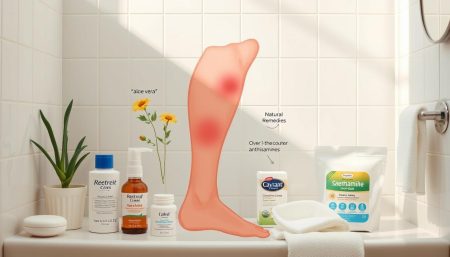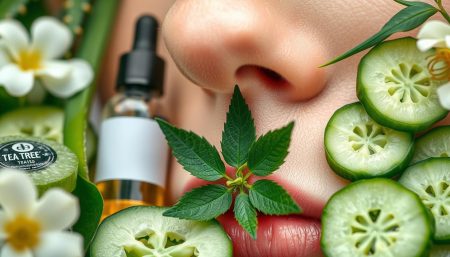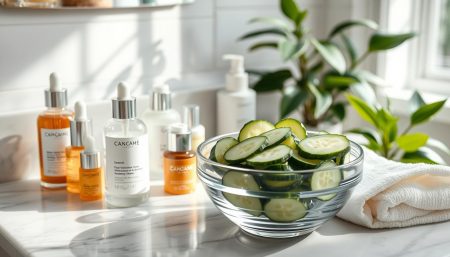For many, acne scarring is more than a skin issue; it’s a fight against lasting reminders of skin problems. The path to healing from acne scarring seems tough, but it’s filled with hope and change. With the right acne scar remedies, you can start to fix your skin. Let’s look at how to heal, understand the healing process, and move towards a future where your skin’s story is one of renewal.
Key Takeaways
- Understanding the different types of acne scars is key to finding the right treatment.
- Healing from acne scarring is a complex challenge with solutions that fit you.
- Comprehensive guides and expert advice are crucial for effective acne scar remedies.
- Acne scars can fade with the right treatments and lifestyle changes.
- Preventing future scarring is important, and early treatment is key.
- Exploring both in-office and at-home treatments tailored to your skin’s needs.
Understanding Acne Scars and Their Formation
Many people struggle with acne scars, looking for ways to treat and reduce them. Knowing how scars form is key to fighting them effectively.
Types of Acne Scars
There are different types of acne scars, each needing its own treatment. The main types are:
- Atrophic scars: These are depressions left by acne, hard to treat because of the skin damage.
- Hypertrophic scars: These are thick, raised scars that happen when too much collagen is made as acne heals.
- Post-inflammatory hyperpigmentation: This is a skin discoloration that looks like a scar but isn’t, appearing as acne heals.
The Healing Process of Skin
Knowing how skin heals is important for reducing scars. The healing process has several stages:
- Inflammation: The body’s first response to injury, which can cause darker spots if it lasts too long.
- Cell Production: New cells start to replace damaged ones.
- Collagen Remodeling: Scar tissue reforms, which can result in smooth skin or scars, depending on the process.
Good treatments for acne scars help the healing process and prevent bad scar tissue. Early treatment and the right treatments can greatly reduce scars, making skin look clearer and healthier.
Factors That Influence Acne Scar Healing
Knowing what affects acne scar healing is key for acne scar prevention and reducing acne scar appearance. Genetics, skin type, acne severity, and wound healing are all important. They determine how well the skin recovers after acne.
Collagen production and skin cell turnover are crucial. For those wanting to prevent acne scars, more collagen means smoother skin. This makes scars less visible over time.
- Genetic predispositions affect how your skin reacts to inflammation and scarring.
- Oilier skin types might find it harder to fight acne scars.
- Deeper acne, like cysts, can leave more noticeable scars.
Treatments that aim to reduce acne scar appearance work by boosting the skin’s repair. They help the skin heal faster.

External factors like sun exposure and skincare routines can speed up or slow down healing. Eating well, staying hydrated, and avoiding the sun help the skin heal. Keeping the skin clean and moisturized is also important for acne scar prevention. Everyone’s skin is different, so treatments should match your skin’s needs for the best results.
By focusing on these factors, you can help your skin heal and stay resilient against future scars.
Do Acne Scars Go Away Over Time?
Many people wonder if acne scars can fade over time. The body’s natural ability to heal plays a big role in healing from acne scarring. But, how fast it happens depends on many things like your skin type, age, and how bad the acne was.
As time goes by, acne scars can look less noticeable. This is because the skin regenerates itself. New skin cells replace the old ones, helping fading acne scars. It’s important to be patient, as this can take months or even years.
“Many clients see noticeable improvements in the appearance of acne scars after about six months of consistent skincare routines,” shares a renowned dermatologist in a recent interview.
- Daily Sun Protection: UV rays can make scars look worse.
- Maintaining Hydration: Keeping your skin moist helps it heal faster.
- Using Gentle Skin Care Products: Harsh chemicals can slow down healing.
While scars can fade naturally, some steps can help. Protecting your skin from the sun and staying hydrated can speed up healing. So, while your body heals, using good skincare and protecting your skin helps too.
Proven Acne Scar Treatments
Professional and home-based solutions for acne scar removal are effective. They help reduce scar visibility and promote healthier skin. We’ll look at both in-office procedures and home treatments.
In-Office Procedures
In-office treatments use advanced technologies for better results. They target deeper skin layers. Here are some top procedures:
- Laser Resurfacing: Uses light beams to remove skin layers, leading to smoother skin.
- Fillers: Raises depressions in atrophic scars, making them less visible.
- Microneedling: Creates tiny skin punctures to boost collagen and elastin, filling scars.
Topical Treatments
Topical treatments are great for mild scarring. They’re less invasive than in-office methods. Key options include:
- Retinoids: Speed up cell turnover, reducing scar appearance over time.
- AHAs (Alpha Hydroxy Acids): Exfoliate the skin, improving scar and skin tone.
These treatments not only reduce scars but also improve skin texture and health.
The Role of Dermatology in Acne Scar Removal
Dermatology is key in fighting acne scars. Experts offer many dermatological solutions for scars to fit each patient’s needs. Let’s explore how dermatologists boost acne scar treatments effectiveness.
The first step is a detailed check-up. Dermatologists figure out the type of acne scars you have. Knowing this is important because each scar type reacts differently to treatments.
After the check-up, your dermatologist will suggest a treatment plan just for you. This plan might include laser treatments or chemical peels. These methods aim to make scars less visible and help your skin heal.
- Initial Consultation – Discuss your skin history and goals
- In-depth Skin Analysis – Identify types of acne scars
- Custom Treatment Plan – Tailored to your specific scar types and skin health
- Progress Tracking – Regular check-ups to monitor improvements and make adjustments
Getting help from a dermatologist ensures you get the best acne scar treatments. It also lowers the risk of harming your skin with the wrong treatments. Dermatologists play a crucial role in helping you achieve the best skin results.
By talking to a dermatologist, you get access to the latest dermatological solutions for scars. This makes your path to clearer skin both scientifically backed and personalized for you.
Fading Acne Scars with Home Remedies
Looking for acne scar remedies often leads us to natural solutions. Many of these can be found in your kitchen or medicine cabinet. Trying different treatments can be a challenge, but using natural ingredients may help improve your skin’s look and feel.

Popular home remedies include lemon juice, honey, and essential oils. Let’s explore how these can help heal and fade scars:
- Lemon Juice: Its natural bleaching properties can lighten dark scars. It’s full of vitamin C, which helps your skin make collagen. Mix it with water to avoid irritation.
- Honey: Honey is great for moisturizing and healing. It’s antibacterial and can reduce inflammation on scars.
- Essential Oils: Oils like tea tree or lavender can help regenerate skin and reduce scars with regular use.
These acne scar remedies are easy on the wallet and simple to find. But, remember to test them first. Everyone’s skin is different, and reactions can vary.
To get the most out of these treatments, add good skincare habits. Drink plenty of water, eat well, and protect your skin from too much sun. Remember, these natural solutions for scarring might take time to work.
Minimizing Acne Scarring Through Prevention
Preventing acne scars starts with managing acne early. This reduces the chance of scarring. By treating acne quickly and making lifestyle changes, you can lessen scar severity.
Importance of Early Acne Treatment
Starting acne treatment early is key to getting rid of acne scars. Dermatologists stress the importance of acting fast. They recommend using the right skincare and sometimes prescription meds to control outbreaks.
Early treatment stops acne from getting worse. This prevents severe scarring, especially from nodular or cystic acne.
Lifestyle Adjustments to Prevent Acne
Living a healthy lifestyle is crucial for acne scar prevention. Keep your skin clean, use non-clogging makeup and skincare, and watch what you eat. Drinking enough water, sleeping well, and managing stress also help keep your skin clear.
Also, protect your skin from too much sun. Use sunscreen to stop acne marks from getting darker. These steps help manage acne and reduce scar risk.
Following these tips helps prevent acne scars. It keeps your skin smooth and clear for a long time.
Advanced Solutions for Acne Scar Removal
Looking into advanced scar removal methods is key for those wanting to lessen acne scars. This part explores acne scar treatments with the latest tech and methods. These aim to greatly improve skin texture and look.
Laser Therapy
Laser therapy is a top choice for acne scar treatments. It uses light to help the skin heal or remove skin layers. This can make scars look and feel better. Fractional lasers treat small skin areas, healing faster with less downtime.
Chemical Peels and Microdermabrasion
Chemical peels use a strong solution to remove skin layers, reducing shallow scars. Microdermabrasion sands the skin’s surface. Both are good for mild scars but may need many sessions for results.
Choosing an advanced scar removal method depends on skin type, scar type, and downtime. Each method has its benefits and risks. Talk to a dermatologist to learn more. For more info, check out this resource.
| Treatment Type | Typical Application | Effectiveness |
|---|---|---|
| Laser Therapy | Best for atrophic, boxcar, and rolling scars | High |
| Chemical Peels | Best for mild to moderate acne scars | Moderate |
| Microdermabrasion | Best for mild acne scarring and discoloration | Mild to Moderate |
The latest in acne scar treatments brings hope and many options. From laser therapy to microdermabrasion, there’s something for every scar type and severity.
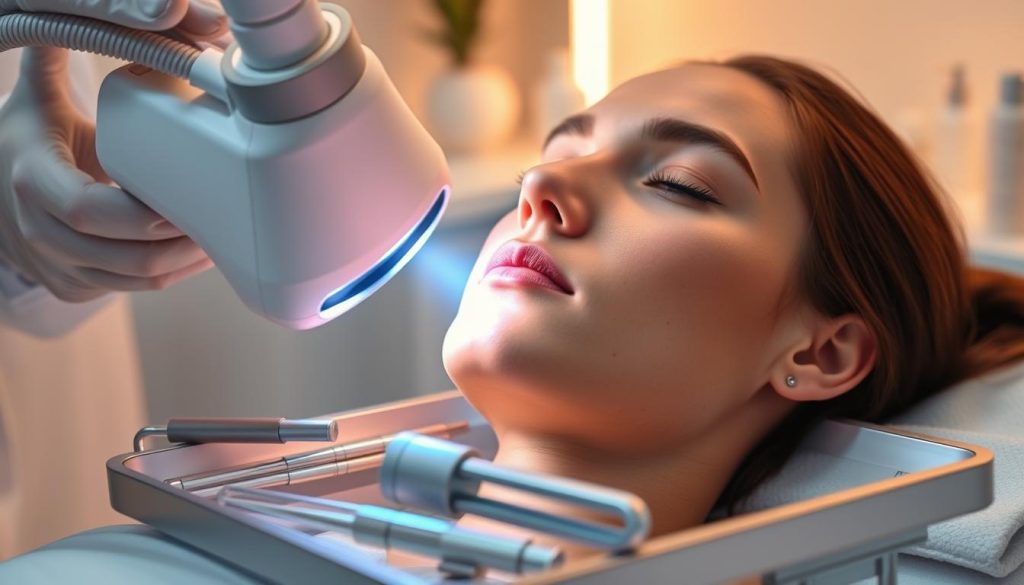
How Diet and Nutrition Affect Acne Scars
Looking into how what you eat affects healing from acne scarring can be very enlightening. It shows how important it is to understand the diet impact on skin health. This part talks about how certain foods can help lessen acne scars and stop new ones from appearing.
Some foods are great for fixing skin and reducing swelling, which helps with acne scars. On the other hand, some foods might make things worse by causing more swelling or irritation.
- Omega-3 fatty acids in fish and flaxseeds help fight inflammation and aid in healing from acne scarring.
- Vitamins A, C, and E are antioxidants that help keep skin healthy and promote healing.
- Zinc supplements can lessen acne by boosting the immune system and reducing swelling.
Drinking enough water is also key for skin health. It keeps the skin moist and helps it heal faster, making acne scars less noticeable.
| Food Category | Benefits | Examples |
|---|---|---|
| Anti-inflammatory Foods | Reduces skin inflammation, aids in healing | Salmon, Berries, Avocado |
| Antioxidant-rich Foods | Supports skin cell renewal and repair | Oranges, Nuts, Green leafy vegetables |
| Hydrating Foods | Improves skin elasticity and moisture | Cucumber, Watermelon, Apples |
The diet impact on skin health is a big deal for managing and healing acne scars. Eating foods that are good for your skin can make your skin look better and feel healthier.
Getting Rid of Acne Scars with Prescription Medications
Many people look into prescription treatments for acne scars. These strong solutions often work better than what you can buy over the counter. Dermatologists often recommend retinoids and antibiotics to help reduce scars.
Retinoids, like tretinoin, speed up skin cell renewal. This helps scars fade by growing new skin. Antibiotics fight inflammation that can make scars worse. It’s important to use these treatments as your dermatologist advises to get the best results and avoid side effects.
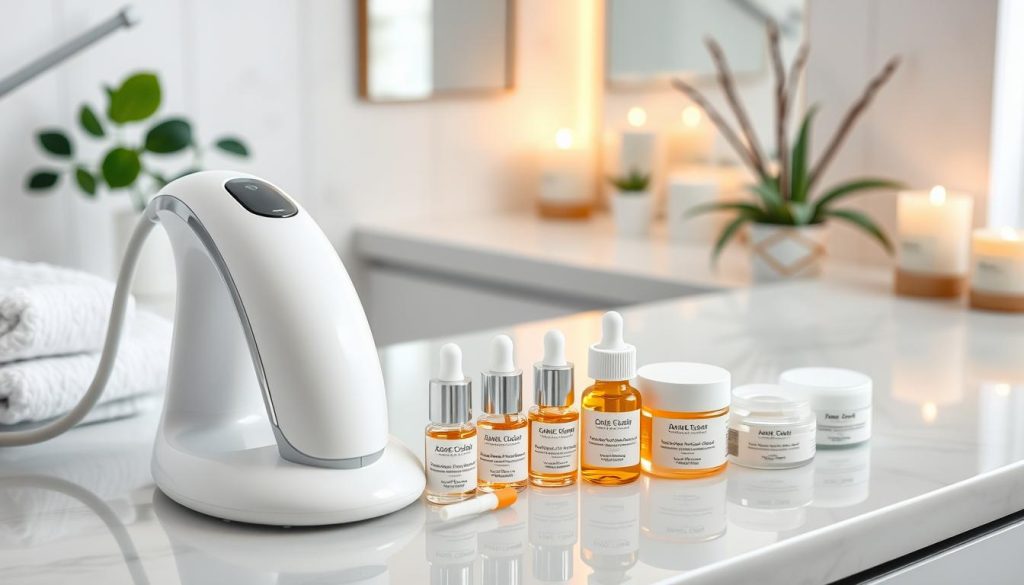
Here’s a table comparing two common prescription treatments for scars. It shows their uses and benefits:
| Treatment | Type | Primary Benefit | Typical Duration |
|---|---|---|---|
| Tretinoin (Retin-A) | Retinoid | Increases cell turnover | 3-6 months |
| Clindamycin | Antibiotic | Reduces inflammation | 1-3 months |
Choosing the right prescription treatment is important. But following a good skincare routine is key too. Listening to your dermatologist’s advice can make a big difference in removing acne scars.
Acne Scar Remedies Backed by Science
When looking for acne scar remedies, it’s key to choose ones backed by science. This makes sure they are safe and work well. We’ll look at some science-based acne scar treatments that are known for their effectiveness in healing and reducing scars.
Top acne scar remedies include medical-grade topical treatments. These treatments have ingredients like retinoids or alpha hydroxy acids. Studies show they can make skin look better and lessen scar appearance.
- Chemical Peels: This method uses a solution to remove old skin, helping new skin grow.
- Laser Therapy: Laser treatments use light to reduce scars and help skin heal.
- Microneedling: Tiny needles create small injuries in the skin, starting the healing process.
People often choose less invasive options like dermal fillers or microneedling. These can make skin look better for a while. Always talk to a dermatologist to find the right treatment for your skin and scars.
| Treatment | Effectiveness | Typical Duration |
|---|---|---|
| Chemical Peels | High | 1-2 months |
| Laser Therapy | Very High | 6 months – 1 year |
| Microneedling | Moderate to High | Up to 6 months |
For more info on treatments and their science backing, check out online resources. But, always pick treatments that science supports. This helps avoid bad side effects and gets the best results.
Reducing Acne Scar Appearance with Lifestyle Changes
Making lifestyle changes can greatly improve your skin’s health and reduce acne scars. Simple changes in your daily routine can make a big difference. We’ll explore how sleep, stress, and exercise impact your skin.
The Impact of Sleep and Stress on Skin Health
Getting enough sleep and managing stress are key to better skin. Sleep helps repair and renew skin cells, making scars less noticeable. On the other hand, too much stress can worsen skin problems and slow healing. Techniques like meditation or yoga can help manage stress.
Exercise and Acne Scarring
Regular exercise boosts blood flow, which feeds and keeps skin cells healthy. It also helps reduce stress and can make acne scars less visible by improving skin health.
Here’s how these lifestyle factors affect your skin:
| Lifestyle Factor | Benefits | Impact on Skin Health |
|---|---|---|
| Sleep | Enhances skin cell regeneration and repair | Can reduce the visibility of acne scars |
| Stress Management | Decreases cortisol levels, less inflammation | Improves skin clarity and condition |
| Exercise | Increases blood circulation, reduces stress | Supports skin health and may reduce acne marks |
Conclusion
In our detailed look at acne scars, we’ve found out what causes them and the different types. We’ve also seen the many treatments available to help heal them. Factors like genetics, skin type, and how bad the acne was are key in skin recovery.
For treating acne scars, a mix of in-office treatments, home remedies, and a healthy lifestyle is important. Early treatment is crucial for both looks and long-term skin health. Everyone’s skin is different, so treatments need to be custom-made.
As we wrap up, it’s encouraging to see how far dermatology has come. It offers hope to those dealing with acne scars. Whether it’s lasers, chemical peels, or creams, there’s a chance for improvement. Use this knowledge to take charge of your skin care. With dedication and the right approach, you can get on the path to better skin.
FAQ
Do acne scars go away on their own over time?
Acne scars may fade as your skin regenerates. But, this can take months to years. Some scars might need treatment to look better.
What are some effective in-office procedures for acne scar removal?
Procedures like laser resurfacing and fillers can help. Microneedling and chemical peels also work. A dermatologist can help choose the right one for you.
Can topical treatments really help with acne scars?
Yes, treatments with retinoids and alpha hydroxy acids can help. They promote new skin and collagen.
What should I expect during a consultation with a dermatologist for acne scar treatment?
A dermatologist will check your skin and scars. They’ll talk about your options and make a plan. This might include treatments or home care.
Are there any home remedies effective for fading acne scars?
Remedies like honey and lemon juice might help a bit. But, they’re not as strong as professional treatments. Always test new things on a small area first.
How can I prevent acne scars from forming?
Start by treating acne early. Avoid picking spots. Use good skincare and make healthy lifestyle choices.
What is the role of diet and nutrition in healing acne scars?
Eating well supports skin healing. Foods with antioxidants and omega-3s help. Staying hydrated is also key.
Are prescription medications effective for getting rid of acne scars?
Yes, retinoids can help by renewing skin cells and boosting collagen. Talk to a dermatologist about what’s best for you.
What lifestyle changes can reduce the appearance of acne scars?
Getting enough sleep and managing stress helps. Regular exercise also improves skin health. These can reduce scar appearance.
What acne scar treatments are backed by science?
Treatments like laser therapy and chemical peels are proven. So are retinoids and AHAs. Studies show they work well.












